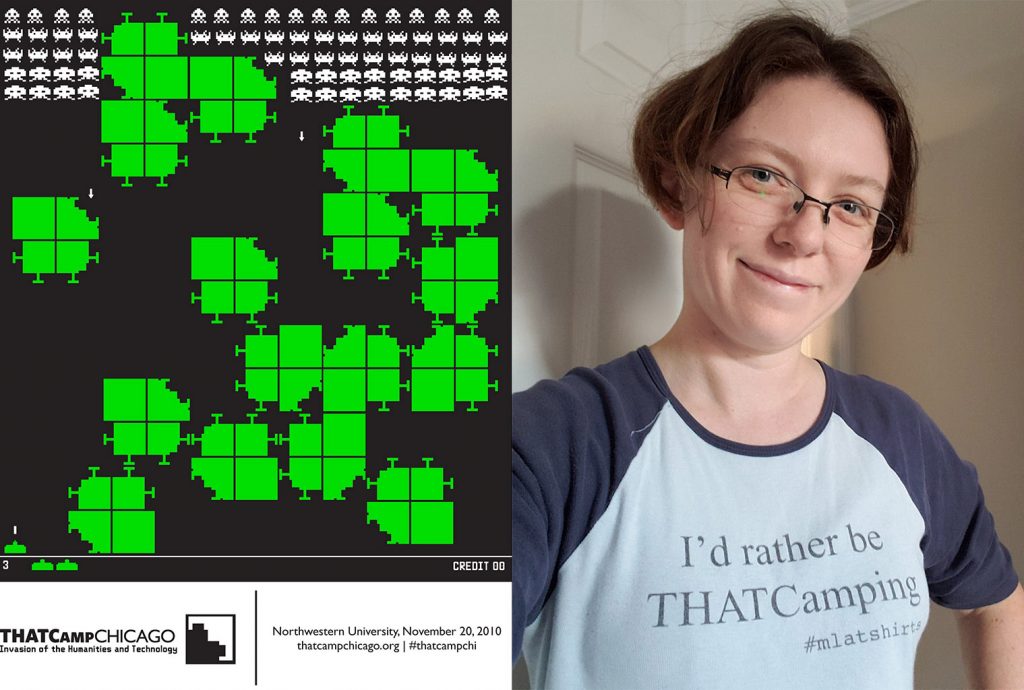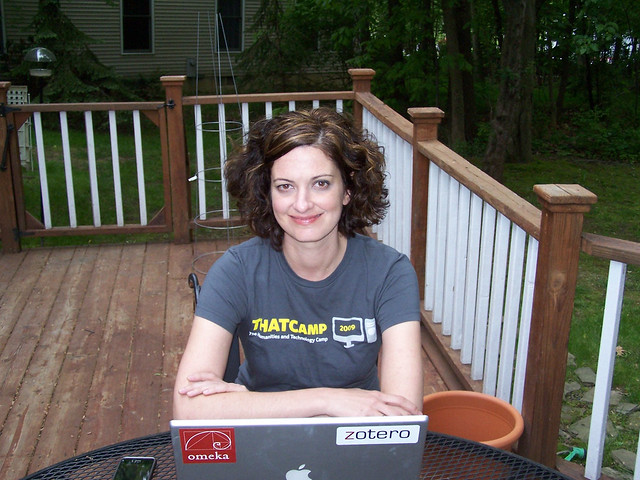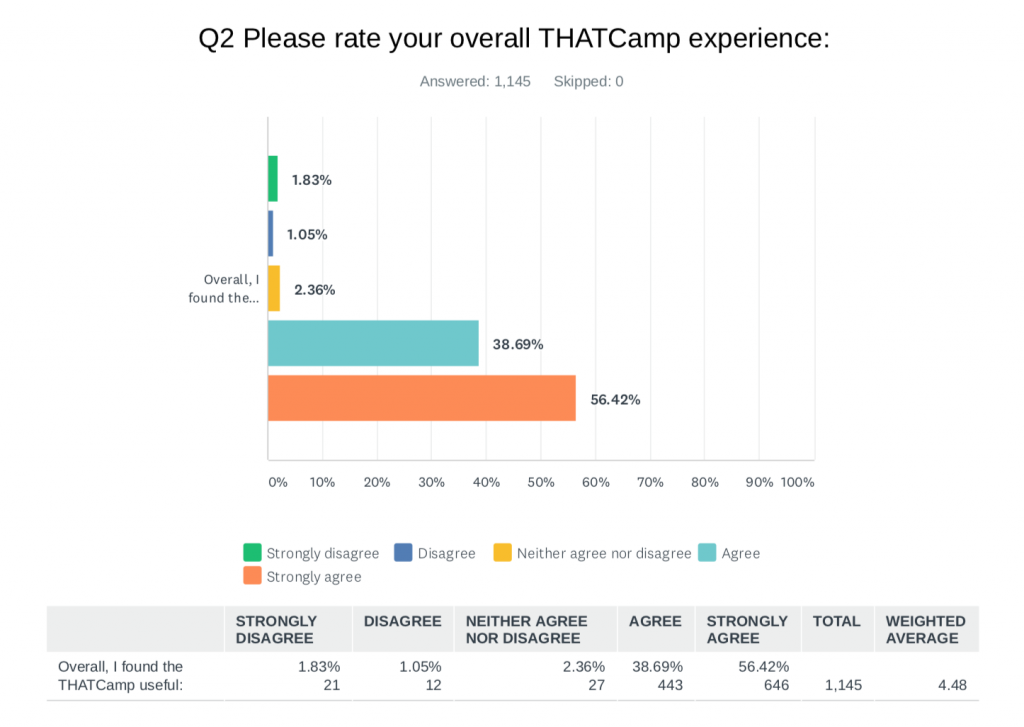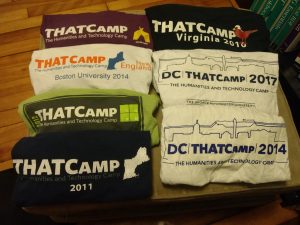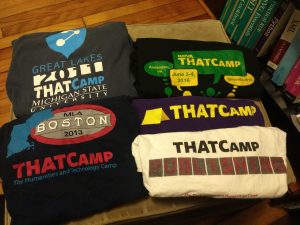When I attended THATCamp in 2010, I had just defended my dissertation, and I was trying to figure out who I was supposed to be now that I had supposedly grown up. Looking back at my session proposal that year, my post is full of earnestness, citations, and uncertainty—I proposed “Remixing Academia” but it is painfully obvious that I had no idea yet what that meant. I wasn’t even sure what the “digital humanities” meant, or if there was space for me in it. Exhausted from dissertation-writing and dubious about the future, I almost skipped THATCamp that year.
Writing this nearly a decade later, I realize how lucky I was in that moment. I had a job lined up: a visiting position, at the same university where I’d finished my not-a-PhD, which meant an easy teaching transition and the comfort of a stable salary for a year of applying to tenure track positions. A graduate today is unlikely to be anywhere near as comfortable, and it was in part thanks to that comfort that I could be in the state of existential anxiety, equally terrified about not being taken seriously and, perhaps worse, needing to be serious.
THATCamp provided something I didn’t know I needed: many, many models of how to be an academic, and space to play at academia. THATCamps, and the community I found and followed on Twitter, showed me that one could be an academic and have a Twitter account akin to performance art ala Mark Sample. It brought me to ProfHacker, and the spirit of sharing and collaboration driving that project, which in turn transformed my own approach to the classroom. While academic conferences showed me what I might strive for in my work, I credit THATCamp with the values I have as an academic today: a decade later, directing a PhD program in Texts & Technology, when I once questions whether I even belonged in the “digital humanities” at all.
I realized today as I was gathering thoughts to write this post that I have very few pictures of THATCamps. I have memories: sitting in conference rooms with fellow humanists making strange video games; exchanging Twitter handles with people who would later become the writers of foundational texts in courses I’d not yet imagined teaching; gathering outside and in random spots with others interested in topics—including games—that hadn’t quite made the cut for formal sessions. I’m honestly not even sure the phone I had at the time had much of a camera, and if it did, the badly-framed, low-resolution shots I no doubt took are lost to me.
With that said, I do have an image I can recall of a group of lunch compatriots gathering at THATCamp CHNM to discuss games. I feel like we sat outside, on the steps, but that might be my brain trying to make us cinematic in retrospect. The energy and enthusiasm of our group was compelling—this was years before GamerGate, years before the moments that would make it difficult for me to find any enthusiasm for games in the mainstream—and we were all envisioning how play might transform our fields.
We should have a THATCamp just about games, someone said.
Yes, we should.
And thus, Amanda Visconti and I became THATCamp organizers.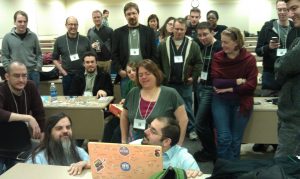
My “official” THATCamp attendance record lists 9 camps, but that’s in part because the two THATCamps that stand out most in my memory—the first and second iteration of THATCamp Games—were hosted outside the main platform, on my own server, where they still live on (for now). THATCamp Games is also the source of my favorite THATCamp photo:
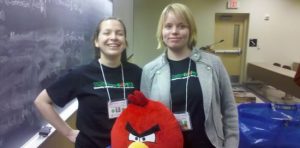
THATCamp Games was an idea that shouldn’t have worked. I was a relatively new professor, two years out of graduate school and working at a small campus, primarily teaching programming and feeling more distant from the humanities with every passing semester. Amanda Visconti was then a graduate student working on an amazingly experimental dissertation, and her role at MITH and the support of our mentor Matt Kirschenbaum made it possible to float the idea of hosting an unconference.
Neither one of us had ever hosted anything before, but we were determined. Some of our decisions were questionable (Maryland in January, anyone?), and a few campers never arrived due to snow. But the rest of us played, and made, thanks to a day of workshops focusing on inclusive tools for design that offer a snapshot of a moment before Chris Klimas (in attendance at the camp) released a version of Twine that would capture the imagination of game artists around the world. It feels self-serving to wax nostalgic about that weekend, so I’ll leave my reminiscing there and say only that together, we were academics at play, and I at least believed then that our play could revitalize the universities and other institutions we would return to.
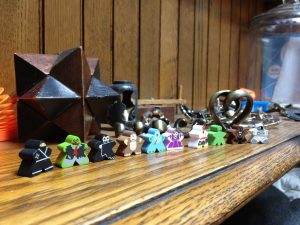 THATCamp Games had a few sequels, including the amazing “II” event hosted by Lee Zickel at Case Western, and a more low-key attempt by me to bring unconference collaboration to the NASAGA (North American Simulation and Games Association) conference when I hosted it in Baltimore. That was also the first THATCamp where I noticed the shift in the culture, a shift that would become more apparent as I started attending THATCamps in Florida – far from CHNM, with their own DH cultures and communities, and where the newcomer approach was still working.
THATCamp Games had a few sequels, including the amazing “II” event hosted by Lee Zickel at Case Western, and a more low-key attempt by me to bring unconference collaboration to the NASAGA (North American Simulation and Games Association) conference when I hosted it in Baltimore. That was also the first THATCamp where I noticed the shift in the culture, a shift that would become more apparent as I started attending THATCamps in Florida – far from CHNM, with their own DH cultures and communities, and where the newcomer approach was still working.
It was at these later THATCamps that I noticed the diminished connections: the hashtag was slowly abandoned, and the sense of a larger THATCamp community was lost. For me, it was impossible to recapture the enthusiasm and optimism of my earlier THATCamp experiences: it’s not THATCamp that changed, really, but we did. Many tried to reimagine a THATCamp for us jaded veterans: I was honored to be part of the THATCamp Council and briefly play a role in supporting the community and trying to imagine that future. However, I’m not surprised to be writing this now, watching the last reminiscing of fellow THATCamp-ers realizing how much has changed for all of us in over a decade. What we need next is uncertain: stronger online communities, perhaps; ways to address our role as tech-focused humanists in climate change; and broader conversations about a frightening future for our universities. I hope whatever we build to face these next challenges has moments as playful, unruly, and un-disciplined as our THATCamp days.

